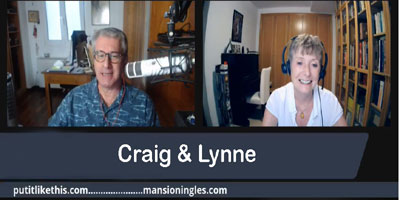BROADCASTING
LIVE WITH LYNNE AND CRAIG
|
|
|||
|
It’s all in the News - or is it? |
|||
|
|
|||
It’s all in the News - or is it?
Introduction
Most people talk about the news whether it´s international,
national or local events or even just things you and your friends have been up
to. Today we’re going to talk about the news and look at some vocabulary that
often comes up in this context.
Some general collocations
Latest / Breaking / Old / Good and bad / fantastic / marvellous / heartening /
interesting / welcome /shocking / distressing / terrible / depressing /
unwelcome
Remember:
• news is uncountable. If you want to make it countable you
say a bit/a piece of news
• We often use the present perfect with I/you: Have you heard…?
• Use past simple if you’re using time references eg. Yesterday, Last week
• News reporting (journalists) often uses impersonal passive structures eg.
“They are said to be..It has been announced…Over 500 people are reported to have
been injured in…”
Where do you get your news from?
Media: print / online / radio /social media / TV / other sources /Primary and
secondary sources / first-hand accounts / eye-witness accounts/ live reporting /
breaking news
Primary and secondary sources: Primary sources are firsthand accounts or
original documents, while secondary sources interpret or analyze primary sources.
Both are used in journalism to establish credibility.
Can we believe the news? Is it reliable?
Vocab: credible/unverified sources/misinformation vs disinformation/fake news/hoax/propaganda/verifying
source/ fact-checking/critical eye
What is the difference between misinformation and disinformation?
Misinformation is false or inaccurate information spread without harmful intent.
Disinformation is deliberately false information intended to deceive or mislead.
• How can we distinguish reliable news from fake news or hoaxes?
• Do you always believe news from your family and friends ? Why?/Why not?
• Critical thinking - What is the role of critical thinking in evaluating news
sources?
Critical thinking involves questioning, analyzing, and evaluating information to
determine its credibility and reliability.
• What really makes us believe the news?
What kind of news do we really want?
Vocab: news blackout/clickbait/news distortion/twisted accounts/ confirmation
bias / echo chamber/moderation of news/editorial filtering/bias/news fatigue
(Echo chamber: An echo chamber is a situation where individuals are exposed to
information and opinions that reinforce their existing beliefs, isolating them
from diverse viewpoints.)
Confirmation bias is a bias that influences how an individual processes
information, whereas an echo chamber is an environment or social dynamic in
which people are repeatedly exposed to information that aligns with their
existing beliefs, which can exacerbate confirmation bias.
Confirmation bias is a personal cognitive tendency, while an echo chamber is a
social or informational context.
TAMBIÉN TE PUEDE INTERESAR:
La Mansión del Inglés. https://www.mansioningles.com
© Copyright La Mansión del Inglés C.B. - Todos los Derechos Reservados . -



